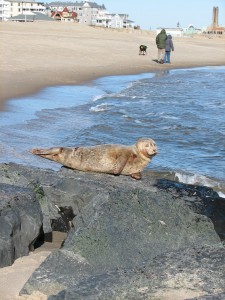Marine Mammal & Sea Turtle Week (Part 3 of a 5-part Series)
With Memorial Day Weekend upon us, summer is unofficially here for New Jerseyans. That means plenty of tourists enjoying shore, sand, surf, and sun – but it also means other types of annual summer visitors to our coast: bottlenose dolphins, sea turtles, and whales. However, what may be inspiring sightings from a healthy distance can become tragic encounters when marine animals become stranded or entangled in nets.
This story marks the third of five blog stories spotlighting New Jersey’s marine mammals and sea turtles – and educating people how to help animals in need, rather than make a bad situation worse.
Part 1, on Monday, revealed the bottlenose dolphin die-off striking the Eastern Seaboard. Part 2, yesterday, featured a Question-and-Answer on the dolphin mortality event with NOAA’s Mendy Garron. Part 4, tomorrow, will investigate the fascinating condition of cold-stunned sea turtles. And Part 5, on Friday, will reveal the importance of reporting sightings – both for live or dead marine mammals.
MARINE MAMMAL & SEA TURTLE WEEK: Encounter a stranded marine mammal? Here’s how to help (Hint: Don’t try to be a hero!)
By Jennifer Dexter, Conservation Intern
Last year, over 150 marine mammal strandings occurred in New Jersey, ranging from humpback whales to harbor seals.
In order to better prepare first responders and the general public for such incidents, Conserve Wildlife Foundation of NJ hosted the NJ Marine Mammal Stranding Workshop. For me, the biggest take home message I retained from attending this workshop was a clear one: “Don’t be the hero!”

Everyone has good intentions when they attempt to ”rescue” a marine mammal stranded on the beach, but often you may be doing more harm than good. Usually, there is a good reason why the animal washed ashore, whether it be injuries or illness at fault. If you simply return the animal to the ocean, it’s likely that they will just become stranded again.
The same goes for animals in danger at sea, such as a turtle entangled in fishing nets. DO NOT go all gung-ho by jumping in the water in attempt to cut the turtle free, as you are putting the animal and yourself in danger.
Close human interaction will put the already stressed animal in defense mode. Sea turtles, such as the leatherback, can weigh more than 1,000 pounds and one thrash of their flipper can leave a human severely injured. In addition, a human can just as easily become entangled in the netting so it’s best to remain on your boat, safe out of harm’s way.
The best and most helpful thing a witness can do in New Jersey is to immediately call the Brigantine Marine Mammal Stranding Center (609-266-0538) and provide the following information: description of the animal, photograph from a distance, location, and description of any injuries.
Most importantly, do not touch, feed, pour water on, or cover the animal. Stand by until a MMSC staff member or local police is dispatched. From that point on, it will be up to the MMSC and the authorities to assess what measures need to be taken based on the animal’s needs. You can walk away knowing you did the right thing – and helped the animal as much as you could.
Discover more from Conserve Wildlife Foundation of NJ
Subscribe to get the latest posts sent to your email.